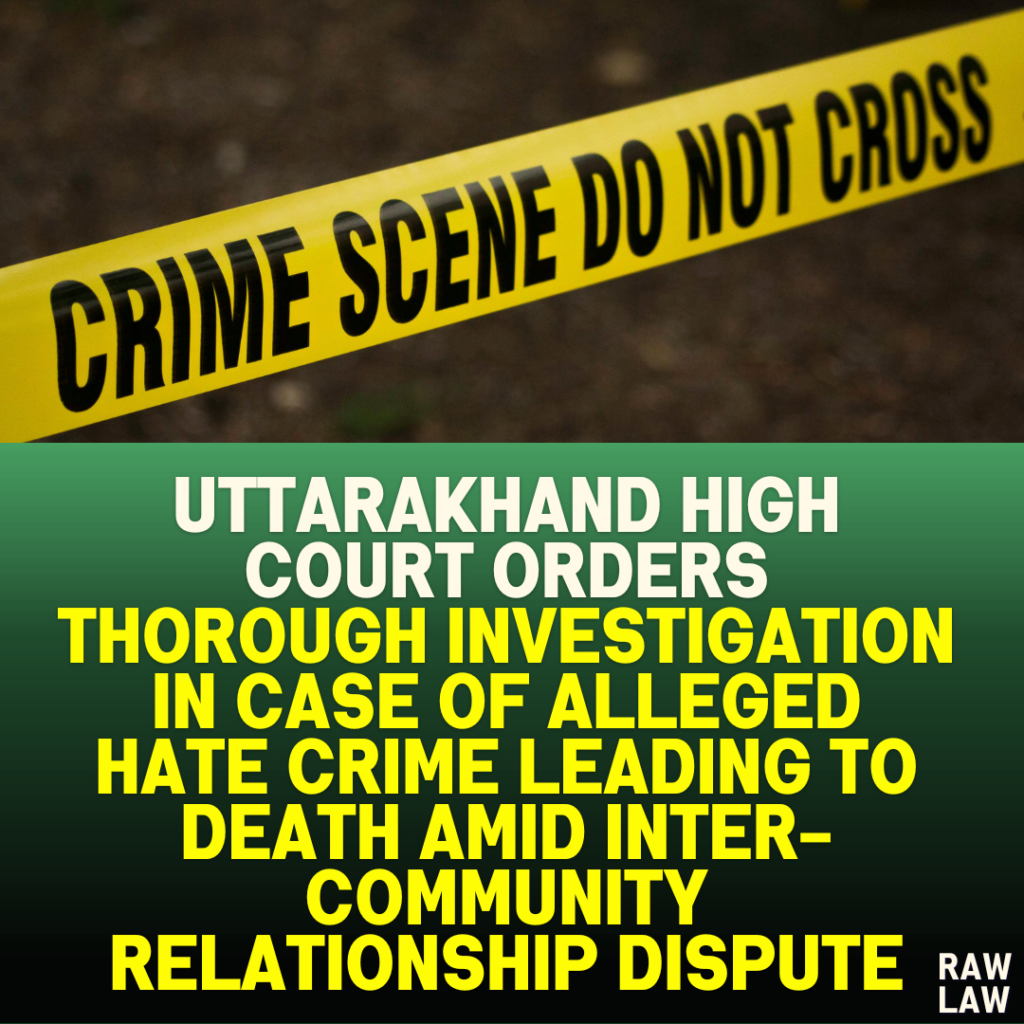Court’s Decision:
The Uttarakhand High Court directed the Investigating Agency to carry out the further investigation in a scientific and professional manner, considering all the available evidence, including inputs from the petitioner. The writ petition was disposed of, emphasizing that the investigation should be conducted comprehensively and without prejudice.
Facts:
The petitioner approached the court alleging that his son, who belonged to a Christian community, was found dead under suspicious circumstances after being last seen with his girlfriend, who belonged to a Hindu community. The petitioner claimed that the deceased and his girlfriend were in a relationship that was opposed by her family. On 06.09.2024, the deceased was last seen alive with his girlfriend on her scooty. The next day, the mother of the girl informed the petitioner that the body of his son was found lying in bushes near her house, leading the petitioner to suspect foul play.
Following this, the petitioner filed an FIR under Section 140(3) of the Bhartiya Nyaya Sanhita, 2023. He alleged that the post-mortem was not conducted properly and critical information regarding the cause of death and the nature of the injuries was omitted from the report.
Issues:
- Whether the police conducted a fair and impartial investigation considering the circumstances of the case.
- Whether the post-mortem was properly conducted and whether it warranted further investigation.
- Whether the CCTV footage from the surrounding areas was properly collected and preserved.
- Whether there was a need for the transfer of investigation to a specialized agency like CBCID or CBI.
Petitioner’s Arguments:
The petitioner argued that:
- The post-mortem report was incomplete and did not accurately reflect the injuries visible on the body.
- The police failed to secure crucial CCTV footage from the scene of the crime and nearby areas.
- The initial investigation appeared biased and did not consider the inputs provided by the petitioner, raising doubts about the fairness of the process.
- The petitioner demanded a transfer of the investigation to a specialized agency for an impartial probe.
Respondent’s Arguments:
The state, through the learned counsel, argued that:
- The injuries found on the body were consistent with a road accident, and no evidence suggested foul play.
- A special police team was formed to conduct a detailed investigation, and CCTV footage from the area was reviewed.
- It was revealed that the deceased was in a close friendship with the girl and visited each other’s homes frequently. Both families had agreed that the couple would marry when they reached the age of majority.
- The state counsel stated that the death appeared to be the result of a road accident involving a dumper truck, driven rashly, and hitting the deceased.
Analysis of the Law:
The court considered the provisions of Section 140(3) of the Bhartiya Nyaya Sanhita, 2023, under which the FIR was registered. This section pertains to offenses affecting public tranquility, including acts that disturb communal harmony. The court emphasized the need for a scientific and unbiased investigation, given the communal sensitivities and the petitioner’s serious allegations of foul play and bias in the police investigation.
Precedent Analysis:
While the court did not cite specific precedents, it reiterated the principle that investigations, especially in cases involving sensitive inter-community relations, must be handled meticulously to avoid miscarriage of justice. The court referred to general jurisprudence emphasizing the right to a fair and unbiased investigation.
Court’s Reasoning:
The court observed that the circumstances of the case, coupled with the petitioner’s allegations and the incomplete post-mortem report, warranted a closer scrutiny of the investigation. The court found that the initial investigation lacked thoroughness and that the petitioner’s concerns about the CCTV footage and post-mortem inconsistencies needed to be addressed. The state’s submission that the death was caused by a road accident involving a dumper truck was not entirely convincing without proper evidence. Thus, the court directed that the further investigation be carried out scientifically and in a professional manner, taking into consideration all available evidence and inputs from the petitioner.
Conclusion:
The High Court directed the Investigating Agency to conduct a thorough and scientific investigation, considering all relevant evidence, and ensure that justice is served without any bias. The court emphasized that the investigation should be conducted from all angles, taking into account the petitioner’s submissions and any other evidence that might surface.
Implications:
This order underlines the necessity for a fair and impartial investigation, especially in sensitive cases involving inter-community relationships. It sets a precedent for judicial intervention where there is an allegation of bias or incomplete investigation by law enforcement agencies. The emphasis on a scientific and professional investigation reinforces the court’s commitment to upholding the integrity of the judicial process and ensuring justice for the aggrieved parties.



